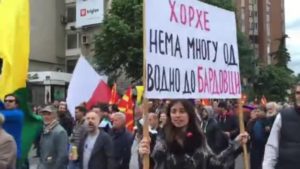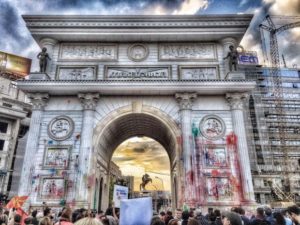2016 has been a turbulent year for the Balkans. But isn’t any year with no war (Turkey certainly came close) a good year by this region’s standards? The Vostokian has been providing you with roundups throughout the year, so now we decided to reflect on 2016 as a whole. From absurd referendums, collective pardons, and Trump-mania to failed coups and momentous elections: the Balkans have seen it all!
10. Bosnia and Herzegovina: Holiday referendum in Republika Srpska (September 25)
Even for a region which has seen it all, Republika Srpska’s referendum on its controversial January 9 holiday was an unprecedented display of Balkan absurdity. Although he very well knew that Constitutional Court decisions cannot be reversed by referendums, President Milorad Dodik orchestrated a bizarre vote to keep the holiday, with 99.79% voting in favor (no wonder – I mean, can you imagine the US voting against celebrating July 4 !?). In a country with countless difficulties, Dodik decided to waste invaluable time and money on a farce of biblical proportions. Well done Mr President!
9. Bulgaria, Croatia, Macedonia, Montenegro, Serbia, Slovenia: Failed UN General Secretary bid (January – October)
Given the UN’s long-held practice of appointing General Secretaries from different regions, East European countries understandably got their hopes up. Some of the most serious contenders came from the Balkans, including but not limited to Bulgaria’s well-respected UNESCO Director Irina Bokova. That is, until Balkan madness came into play, with Bokova being sabotaged and eventually replaced as candidate by her own government. At some point, the UN lost its patience with Eastern Europe and went for Portugal’s Antonio Gutteres instead.
8. Serbia: The Hague gives Karadzic 40 years, but releases Seselj (March – April)
2016 saw the end of an old Balkan saga: Serbian wartime official Vojislav Seselj’s trial at the International Criminal Tribunal ended in shocking acquittal. Having made an absolute mockery of the tribunal for 11 years, Seselj gained somewhat of a cult status at home, resulting in his party winning 23 seats in the April parliamentary elections. General Radovan Karadzic, however, was less fortunate: he was sentenced to 40 years and is likely to spend the rest of his life in prison.
7. Macedonia: Collective presidential pardons for all politicians (April – June)
Thought Bosnia’s referendum was absurd? What about President Gjorgje Ivanov’s attempted pardoning of 56 high-level Macedonian politicians and influential figures? Afraid of the ongoing investigations by the newly formed Special Public Prosecution, mainly against officials from his own party VMRO-DPMNE, Mr Ivanov opted for preventive action. Two months later, he was forced to withdraw all pardons amidst strong domestic and international pressure. Thus, not only did he fail to save his party’s leadership, but he likely inflicted irreparable long-term damage on the party. As for his own presidency, he is surely going down as the single most tragic political personality in Macedonia’s history.

6. Macedonia, Serbia: Trump-mania (July – November)
Now this was something that caught even the biggest Balkan cynics by surprise! With their wounds from the 1999 NATO bombing of Belgrade under President Clinton still fresh, Serbs were so thrilled to see Hillary lose that they set up huge billboards with Trump’s photo in the center of Belgrade (see main picture above). Serbs are forgetting that it was the last Republican president, George Bush, and not Clinton, who encouraged and then recognized Kosovo’s independence. The Trump-mania reached its peak with the proliferation of pro-Trump fake news websites in the Macedonian city of Veles, whose “success” even brought them on Stephen Colbert’s show. Hey, at least they made Macedonia famous!
5. Turkey: Failed coup attempt (July 15)
After the resignation of Turkish Prime Minister Davutoglu who failed to counter Erdogan’s ambition to become a 21st-century sultan, many things went awry in Turkey and culminated in a coup attempt. Unfortunately, many Balkan countries joined President Erdogan’s witch hunt following the unsuccessful coup, with even some unlikely allies like Bulgaria deporting dozens of alleged “Gulenists” to Ankara. What followed was the release of around 40.000 prisoners throughout Turkey to make room for the thousands of soldiers, journalists, judges, and other public servants allegedly involved in the coup.
4. Kosovo: Ups and downs in recognition battle (January – December)
Kosovo made the news for better or worse on a number of occasions in 2016. After UNESCO’s rejection of its candidacy in November 2015, more frustration followed in 2016 with Interpol hinting that Kosovo is a long way from accession. However, it seems that this year brought more good news than bad news for the country. In February, Kosovo signed the vital Stabilization and Accession Agreement with the European Union, followed by a European Commission proposal for visa liberalization in May. In the same month, Kosovo was also admitted to the European football federation UEFA.
3. Bosnia and Herzegovina, Croatia, Macedonia, Montenegro, Serbia: Protests and counter-protests (January – December)
On the surface, 2016 seems to have been a good year for democracy in the Balkans. After all, what better proof that Balkan people are living and breathing democracy than Macedonia’s massive nationwide protests against the pardons in April? At second glance, however, the rise of protests seems to indicate polarization much more than democracy. Macedonia’s Colorful Revolution was paralleled by pro-Ivanov rallies, with the ruling party bribing and blackmailing people across the country to join them. Croatia saw anti-Fascist and Fascist (yeah, for real) simultaneous rallies in the spring, Montenegrins split into a pro-Western and a pro-Russian camp, and Bosnians remained divided along ethnic lines. So, more democracy or more polarization and higher risk of violence?

2. Croatia (?), Greece (?), Macedonia (?), Serbia: Nationalism wins? (January – December)
Judging by 2016 elections in the Balkans, nationalism looks as alive as ever. Serbia’s “reformed” warlords from the 1990s marked their biggest election victory ever in April by clinching over 48% of the vote (hence no question mark for Serbia). Nationalism’s fate is less clear elsewhere in the region, but formally this was a good year for right-wing parties, as Croatia’s HDZ recovered from its collapsed government coalition in the spring and managed to defeat left-wing SDP again in the autumn. Macedonia’s VMRO-DPMNE won a majority of votes for the tenth time in a row in December, while Greece’s Syriza is increasingly losing ground to center-right New Democracy.
1. Croatia(?), Macedonia(?), Montenegro (?): Nationalism loses? (January – December)
A closer look at Balkan politics in 2016 gives a more optimistic perspective. Croatia’s Prime Minister, Andrej Plenkovic, is a much more moderate (and competent) figure than HDZ’s previous leader Tomislav Karamarko and thus marks a significant shift towards the center and away from the hard-line nationalism of late party founder Franjo Tudjman. Developments in Macedonia and Montenegro are even more promising. The October parliamentary elections in Montenegro were again won by Milo Djukanovic’s DPS, but the decade-long, scandal-plagued Prime Minister stepped down, and his successor Dusko Markovic will have to compromise much more given the party’s decreased parliamentary majority. Macedonia’s VMRO-DPMNE also suffered a drastic loss from previous elections and may well not be able to form a government. Djukanovic’s victory proved Pyrrhic. What better start to 2017 for the Balkans than the same thing happening to Macedonia’s Nikola Gruevski?



0 comments